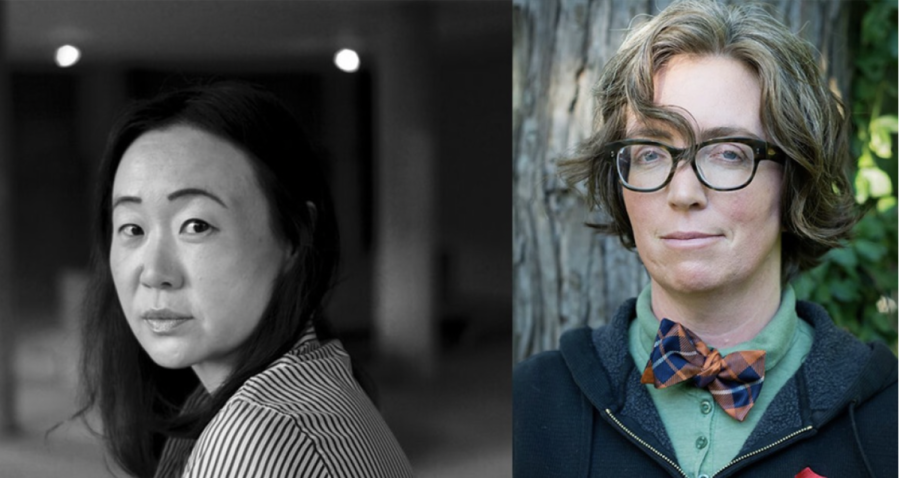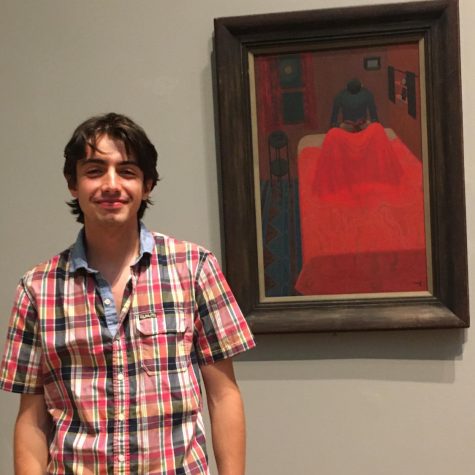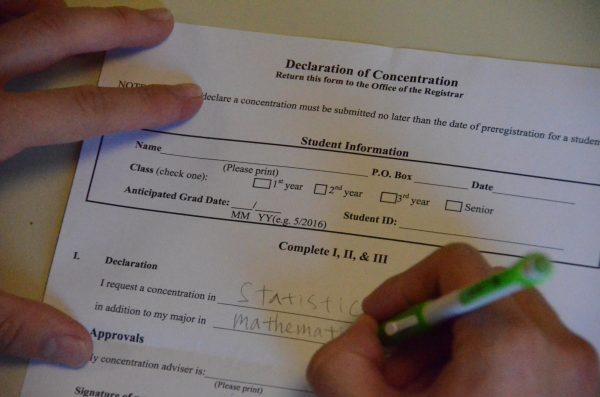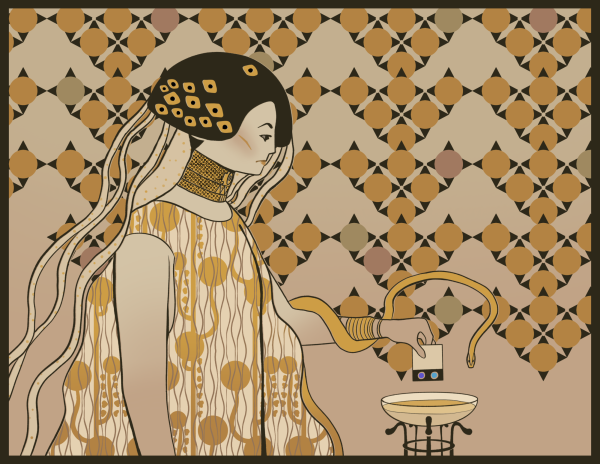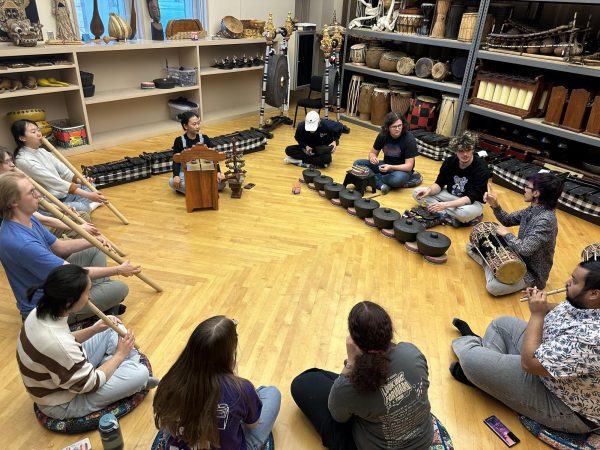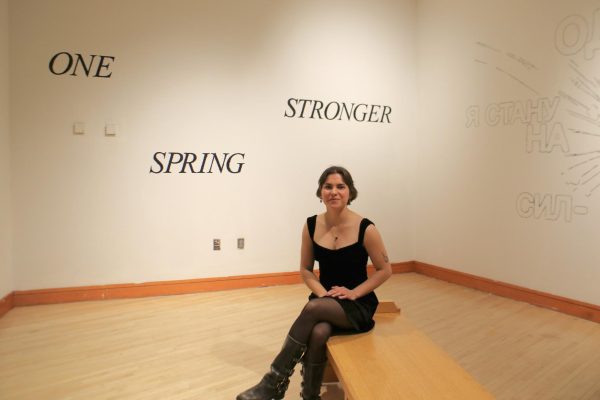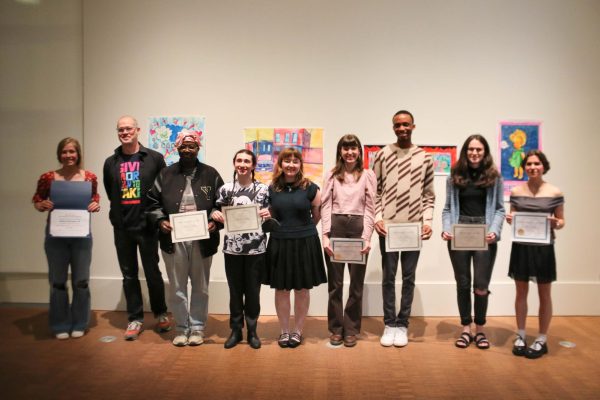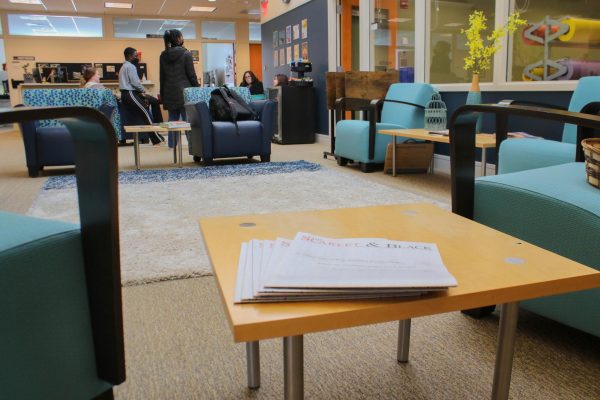Writers@Grinnell hosts poets Sandra Lim and Gabrielle Calvocoressi for mini-residency
L taken by Young Suh. R taken by Levi Strand. Both photos contributed by Grinnell College.
Sandra Lim (L) and Gabrielle Calvocoressi (R).
April 17, 2023
The joy in the Alumni Recitation Hall (ARH) auditorium was palpable the night of Monday, April 10 — peals of laughter erupted as Gabrielle Calvocoressi gave a workshop on an Elizabeth Bishop poem. Despite the workshop being highly informative, it might easily have passed for standup comedy.
The following evening, the joy donned a more subtle garb as listeners left heartfelt thanks to Calvocoressi and Sandra Lim in the comments of a Zoom call following the poets’ joint reading. All this was part of a mini-residency at Grinnell College during which Calvocoressi and Lim did more on campus than the usual Writers@Grinnell roundtable discussion and reading, also leading a workshop entitled Mary Oliver & Elizabeth Bishop: Our Queer and Knowing Pals (If We’re Here To Greet Them) and engaging with students and classes over the course of several days.
Calvocoressi and Lim have each resided at the forefront of the American poetry landscape for several years. Calvocoressi is the award-winning author of three collections — “The Last Time I Saw Amelia Earhart,” “Apocalyptic Swing,” which was a finalist for the LA Times Book Prize, and “Rocket Fantastic,” winner of the Audre Lorde Award for Lesbian Poetry. Calvocoressi is currently the Beatrice Shepherd Blane Fellow at the Harvard-Radcliffe Institute for 2022-2023.
Calvocoressi said in an interview that they began writing poetry at a young age to explore difficult topics they encountered. “In a household and a world filled with secrets and shame — things people didn’t know how to talk about — I had a notebook, [I] had an imaginative life,” Clavocoressi said. “Poetry, before I even thought of it as poetry, was a space where I could talk about things that I didn’t know how to talk about, or how to work with silence and make it generative as someone who lived in a different vessel than I imagined for myself at the time, who didn’t know how to talk about being non-binary, transgender or sexuality in general.”
Citing their influences as Mary Oliver, Elizabeth Bishop, Mark Dody, Marie Howe, Nikky Finney, Lucille Clifton and Marlanda Dekine, Calvocoressi described their journey as one of finding an authentic voice. “The way in which my poetry, or I myself, have ripened, matured or come more fully into myself reflects an ability to talk in a way that feels authentic about the world and myself — in a way where I retain privacy yet also relate to the world, and people can see something about themselves without me telling them about themselves,” Calvocoressi said.
Many of Calvocoressi’s poems take the form of a story, which through the lens of subjective experience, create vivid images and sensations. “Story is really important to me,” Calvocoressi said. “I try to tell stories in my poems without using a traditional narrative form — a lot of narrated poetry feels narrated by an authority which talks at the reader, creating a level of distance. Storytelling feels more human, more idiosyncratic.” In Calvocoressi’s poetry, this often leads to hyper-subjective portrayals of experience which at times feel contradictory, which they say is exactly the point. “My poems are what it means to be in the world and be conscious,” they said. “Poetry isn’t located in being right but in being willing to look at the world and question one’s view.”
Calvocoressi said that ultimately, they hope their poems are an invitation for readers to open themselves up to feelings which can be difficult to express. “I would love poems to be vessels that people can drop into and put on,” they said. “Literature lets us think about the specific ways you’re going to make decisions about how you breathe while reading poems, what images your eye falls in, where you enter a work, whether you share it on social media or keep it under your pillow. In that way, it becomes a testing ground and an opportunity to explore citizenship, and everyone is welcome in my poems. If people feel uncomfortable, I’m willing to have a conversation — I won’t change myself, but I’m willing to speak to anyone.” At the event on Tuesday, Calvocoressi read several emotionally stirring poems which grappled with themes of love, death and the inevitability of loss, before Lim took center stage and read several of her own.
Lim is the author of three poetry collections — “The Curious Thing,” “The Wilderness,” winner of the Barnard Women Poets Prize selected by Louise Glück, and “The Loveliest Grotesque.” An associate professor of English at the University of Massachusetts, Lowell also serves on the poetry faculty at the Warren Wilson College MFA Program for Writers.
Like Calvocoressi, Lim wrote in an email to the S&B that she also gravitated to poetry at a young age, albeit for different reasons. “I always had my nose buried in a book as a kid — it was part pleasure, part covert-training — for life, I imagined. I don’t think I ever consciously considered myself a poet until recently, and even that, well, it happens more in introductions,” she wrote.
Lim was born in Seoul, Korea, and she traces many elements of her poetic expression to that journey. “I came to the U.S. with my family when I was so young, about 4 years old, which makes me part of that so-called ‘1.5 generation.’ I think being part of that generation is reflected in conscious and subconscious ways in my sensibility, my syntax, my fund of images, my preoccupations and obsessions. In other words, it’s everywhere in the work and not always something to be worked up voluntarily, per se,” she wrote.
Lim’s poems experiment with form, ranging from short explosions of verse to much longer poems with themes developed across interlocking sections, blending personal experience with surreal meditations on existence and spirituality. “I would say that in general, I’m working from a vague feeling that’s consuming me in some way, and I have to pin it down, with some precision, if I’m to be satisfied,” she wrote. “In doing that, in realizing and shaping it, I learn more about that feeling or idea, its qualities, and why it has a hold on me. Along these lines, I’m also inspired by questions or problems that I can’t always solve.”
She wrote that, as her career has progressed, she has noticed the evolution of her poetic voice. “My language has become more unadorned with my last two books,” Lim wrote. “There’s the risk of vulnerability in such qualities of voice and straightforwardness, but [there is] also room for an inherent, un-anxious capaciousness and sensuality.”
“Poetry is significant for me,” Lim wrote, “because it helps me to understand and to navigate the world, and it deepens my relationship to it. Though I feel tongue-tied in the face of so many things in my life, in my world, poetry helps me find some illumination, in the many senses of this word: I get a little more detail, beauty, maybe even a flash of insight, (at least, or most of all) some clarification about matters, things, people.”
Calvocoressi and Lim, each in their distinct poetic language, approach subject matter that is at times harrowing with an eye towards opening it up to new meanings, interpretations and emotions. At their reading on Tuesday night, both poets left listeners with an impression of poetry’s transformative power.
Next up in the Writers@Grinnell series, distinguished author Raven Leilani comes to campus on April 20, leading a roundtable discussion at 4:15 p.m. in Humanities and Social Studies Center (HSSC) room S1325, followed by an 8 p.m. reading in the Joe Rosenfield `25 Center (JRC) room 101.




























































